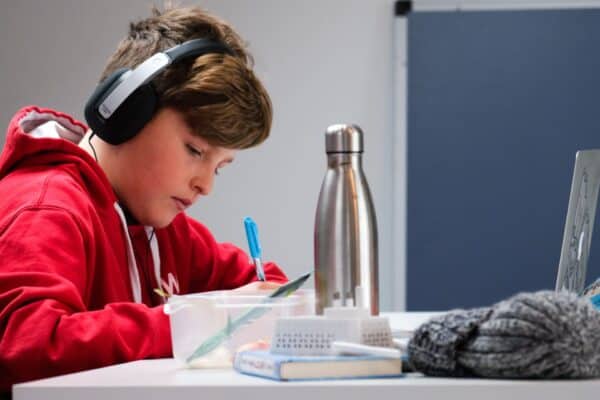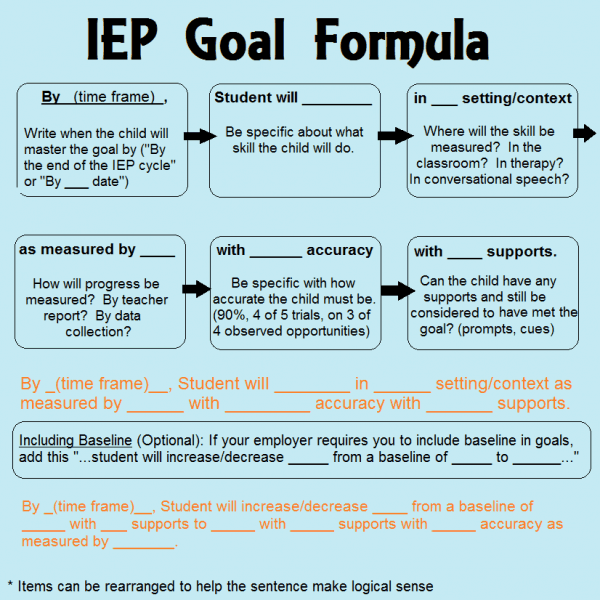28 Sample Vocabulary IEP Goals
Once a child has been identified as a student with a learning disability, it can be tough for the IEP team to come to agreement on IEP goals. After all, depending on the disability, the child may have needs in reading, writing, vocabulary and much more.
And, reading is so much more than reading. It’s decoding, it’s phonemic awareness, fluency and increasing vocabulary. It is with hesitation that I am providing a list of suggestions for vocabulary IEP goals.

And, here’s why. I hope I can explain this well. But, too often, developing vocabulary skills is reduced to memorizing new words and their meaning. A student may be able to regurgitate that information to get by on a test or pass a grade, but true reading skills and vocabulary development is much more than that.
When you have decent decoding and fluency skills, we don’t notice the mini-sequence of events that goes on in our brain when we encounter a new word. We may sound it out. Likely, we will place it in a frame of reference to other words that we are familiar with.
Reading-fluent students will also quickly assess prefixes, suffixes, the root and more–to determine what the word sounds like and means.
If a reading disabled student does not have those foundation skills, true vocabulary development will not happen.
All that to say–too often, on an IEP, I see vocabulary goals like “will get 80% or better on vocabulary quizzes and tests.”

Vocabulary on an IEP
IEP teams need to dig deeper than that. Depending on the IEP evaluations that were completed, all of the information that you need may or may not be available.
But, the team needs to know if all the basic reading skill sets are there before expecting the child to grow and develop a more mature vocabulary.
Learning disabled students may lack vocabulary building skills because of under-developed phonics and phonemic awareness. The team should also decide if speech therapy is warranted. Can the child effectively articulate words?
An SLP and Special Education Teacher might work together in the following ways:
- Together they can design the instruction plan or speech sessions with IEP goals in focus.
- They can ascertain if there are special tools needed to communicate speech and vocabulary fluency.
- IEP goals act as the benchmark for assessing whether the proficiency level is attained or if it requires more or different interventions.
Let’s take a look at the proposed IEP goal list that focuses on reading vocabulary development in children with different learning needs.
Smart Goals for Vocabulary Development
Any IEP goal should be a SMART goal, which means it should be Specific, Measurable, Achievable, Relevant, and Time-bound.
IEP goal writing is part art, part science. Often, the parent and the team are in conflict over which IEP goals should be a priority for the student. Some students have many needs, and to address every need with an IEP goal would be overwhelming.
If you, as a parent, disagree with your IEP team about the IEP goals, learn how to pair the IEP parent concerns letter and PWN.
Here are some examples to get you started. However, it is unlikely that a child only has vocabulary building needs. The lack of ability to build vocabulary is usually one small piece in a much bigger puzzle. I would recommend that these IEP goals for vocabulary, actually be used as IEP goal objectives for a different IEP goal.
Any vocabulary skill listed below should be plugged into the IEP goal formula.

By (time), a student will (mention skill) in (mention place) as measured by (name who will assess) with (level of accuracy – number of times or %) with or without using (mention support, if any).
Listed below is the list of vocabulary-based IEP goals set for an elementary school student as per the standards set by the Kentucky Department of Education.
Reading Vocabulary IEP Goals and Objectives
- Make meaningful words from phoneme: Differentiate and combine phonemes to sound out the word
- Convert combined letters to sounds and then blend sounds to form recognizable words: Child should read each letter and then combine to form the word
- Display understanding of synonyms and antonyms: Learn similar meaning and opposites of words commonly used
- Complete sentence with the correct homonym: Know see/sea, hole/whole, etc., and make a sentence with each.
- Add suffix and prefix to words: For example, learn to use ‘in’, ‘un’, ‘mis’=-”, as prefix and ‘able’, ‘ly’, etc. as suffix to form new words.
- Identify words families: Learn words families wise such as ‘it’ sound words, ‘at’ sound words, etc.
- Recognize and read high-frequency words or sight words: Recognize words like I, me, we, her, here, there, etc.
- Decode unfamiliar words: If any word heard for the first time, the child should decode it into its various parts, or spell it.
If these skills are well beyond your child’s reach, the team needs to back up. Make sure that all areas of need are thoroughly identified in present levels.
Sample IEP Vocabulary Goals
Here are 20 examples of Individualized Education Program (IEP) goals focused on vocabulary development:
- By the end of the semester, the student will increase receptive vocabulary by learning and correctly defining 50 new words relevant to their academic subjects.
- Over the next six months, the student will expand expressive vocabulary by using at least 20 new vocabulary words in spoken and written language each week.
- By the end of the trimester, when presented with grade-level texts, the student will accurately identify and understand the meanings of 90% of unfamiliar words using context clues.
- Within the next grading period, the student will improve understanding and use of academic vocabulary by correctly using at least 15 new vocabulary words in written assignments across various subjects.
- Over the course of the academic year, the student will develop word-learning strategies such as using word roots, prefixes, and suffixes to decipher the meanings of unfamiliar words encountered in reading and listening activities.
- By the end of the semester, the student will increase receptive vocabulary in content areas by mastering at least 100 subject-specific vocabulary words related to science, social studies, or mathematics.
- Over the next six months, the student will improve understanding and use of figurative language by correctly identifying and explaining the meanings of at least 10 idiomatic expressions or metaphors in context.
- Within the next grading period, the student will expand vocabulary related to social interactions and emotions by learning and appropriately using at least 20 emotion-related vocabulary words in daily communication.
- By the end of the trimester, the student will enhance vocabulary acquisition skills by correctly categorizing and organizing words into semantic groups (e.g., synonyms, antonyms, homophones) with 80% accuracy.
- Over the course of the academic year, the student will develop a deeper understanding of word relationships and nuances in meaning by correctly distinguishing between shades of meaning in closely related words (e.g., “angry” vs. “irate,” “happy” vs. “ecstatic”).
- By the end of the semester, the student will expand vocabulary related to academic language by correctly defining and using at least 10 academic vocabulary words per subject area.
- Within the next six months, the student will improve vocabulary comprehension and retention by regularly reviewing and practicing the use of new vocabulary words through flashcards, games, and other interactive activities.
- Over the next grading period, the student will increase vocabulary acquisition skills by actively engaging in vocabulary-building exercises, such as word webs, concept maps, and semantic feature analysis.
- By the end of the trimester, the student will enhance vocabulary skills in reading comprehension by correctly answering questions that require understanding of vocabulary in context in at least 80% of reading comprehension exercises.
- Within the next semester, the student will develop word consciousness and appreciation for language by exploring the origins and etymology of at least 15 vocabulary words and discussing their historical and cultural significance.
- Over the next six months, the student will improve vocabulary acquisition and retention by incorporating newly learned vocabulary words into daily writing assignments, journal entries, and class discussions.
- By the end of the grading period, the student will expand vocabulary related to critical thinking and problem-solving by learning and correctly using at least 10 domain-specific vocabulary words related to logical reasoning and analysis.
- Within the next trimester, the student will enhance vocabulary skills in oral communication by participating in vocabulary-building activities such as word association games, role-playing scenarios, and vocabulary-rich discussions.
- Over the course of the academic year, the student will develop metacognitive strategies for vocabulary learning, including setting personal vocabulary goals, monitoring progress, and reflecting on effective vocabulary acquisition techniques.
- By the end of the semester, the student will increase vocabulary proficiency in receptive and expressive language by achieving a score of at least 85% on vocabulary assessments administered across various academic subjects.
Vocabulary IEP Goals
A reminder that all IEP goals, for anything, not just reading vocabulary, are to be skills-based. One flaw I am repeatedly seeing is teams using Grade Standards to write IEP goals. IEP goals should be based off of baseline data in the IEP present levels.
If a child is significantly behind their age peers, say reading at a kindergarten vocabulary level instead of 3rd grade, writing IEP goals based off of 3rd grade standards will be meaningless. The supports and interventions put in place to achieve those goals will likely skip over teaching the necessary foundation skills.
A child will never catch up if foundation skills are not taught. Many teams do not like to put in writing how significantly behind a child is. But, just challenging them to a higher level skill without the proper supports will not be successful.
The child will only grow more frustrated and fall further behind.

Progress Monitoring Vocabulary Skills
IEP goals may need changes according to the level of learning disability prevalent. Many times vocabulary skills are assessed only by tests and quizzes given by the teacher.
The teachers may follow these assessment tips to monitor vocab progress:
- Do peer comparison: Check proficiency levels of children and compare them.
- Interview child: Talk with the child and ask questions but hidden in a normal conversation to assess the learning needs.
- Take assessment tests: Tests like WJ Oral Language Subtest, etc. are available.
These are just a few ideas to get you started. As always, solid evaluations are the cornerstone to a robust, appropriate IEP. Adding vocabulary goals to an IEP while ignoring the foundation skills will not be successful for anyone.
More on Reading and Literacy for Students
- 28 Sample Vocabulary IEP Goals
- 20 Listening Comprehension IEP Goals (and Examples)
- How to Write a Meaningful IEP for Dyslexia (includes IEP Goals for Dyslexia)
- 36 Decoding IEP Goals (Examples and Samples)
- 25 Measurable Basic Reading Skills IEP Goals
- Effective Vocabulary Interventions
- Spelling IEP Goals
- How to Write a Meaningful IEP for Dyslexia (includes IEP Goals for Dyslexia)
- 36 Decoding IEP Goals (Examples and Samples)
- 25 Measurable Basic Reading Skills IEP Goals
- 16 IEP Goals for Phonemic Awareness
- 14 Letter Recognition IEP Goals (including OT)
- 28 Sample Vocabulary IEP Goals
- 60 Kindergarten IEP Goals including Reading, Writing and Math
- 53 Measurable IEP Goals for Writing and Written Expression (and Objectives)
- 46 Reading Comprehension IEP Goals, including Fluency


